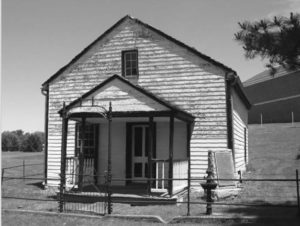Dr. Peter Fahrney was born in Lancaster, PA in 1767, orphaned by age two and raised by neighboring families. He learned the trade of a tanner and, together with his wife Eve (Durnbaugh) Fahrney, had 4 children. Sadly, his wife died when their oldest child was only 11 years old. Perhaps encouraged by his in-laws to relocate to Maryland that they might assist in caring for the children, Fahrney moved with his family to the area now known as San Mar. He purchased 42 acres from his father-in-law’s extensive land holdings with the intention of resuming his business as a tanner. But before that enterprise started he was thrown from his horse and suffered a debilitating spinal injury. He had to give up the idea of operating a tannery.
With few options for making a living, Fahrney left his children in the care of their grandparents and returned to Pennsylvania to study medicine. Eventually Dr. Fahrney returned to his family and practiced medicine in the area for over 30 years. He was deeply interested in pharmacology and learned how native Americans utilized herbal medicine. He studied the curative properties of plant material collected in the area and formulated patented medicines. Dr. Fahrney remarried and fathered 7 more children, two of whom also practiced medicine. The medicines he and his descendants developed, bearing names like Blood Purge, Blood Vitalizer and Humor Antidote, became widely popular. His grandson, Dr. Peter Fahrney of Chicago concentrated on marketing these proprietary medicines and shipped them to all parts of the country.
The property for “Fahrney Memorial Home for the Aged” (now Fahrney-Keedy Home and Village) was a gift in 1905 from Dr. Peter Fahrney of Chicago to the Church of the Brethren. The gift was in honor of Dr. Fahrney’s grandfather, of the same name, who had lived in Mapleville and was one of the early physicians of Washington County, Maryland. His log-structure laboratory stood on the grounds of the Fahrney-Keedy Home and Village until December 2008 when it was moved to the Washington County Rural Heritage Museum.



